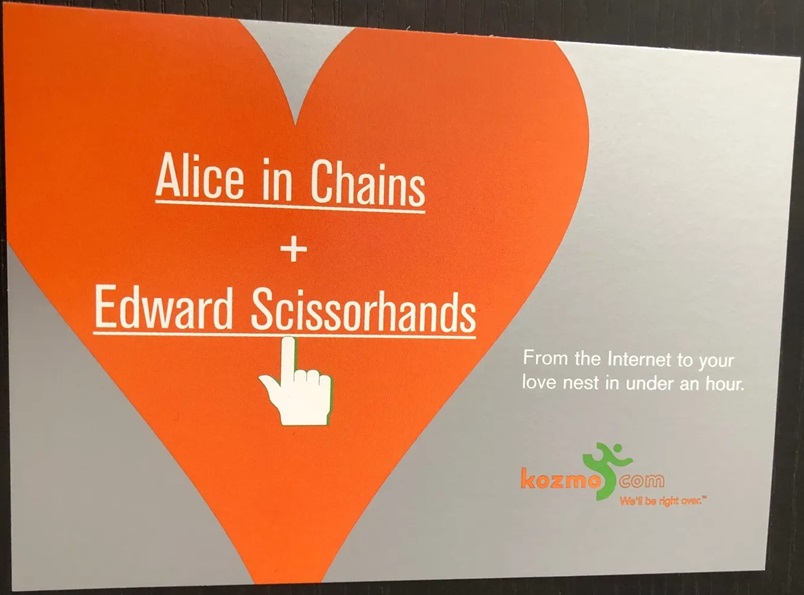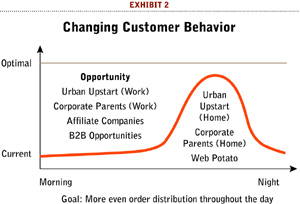grunge nest
originally posted: 2023
There's been a spate of thinkpieces about how apocalyptic online dating is in 2024 (compared, I suppose, to the utopia it was in the 2010s and before). Perhaps they have a point. I mean, just look at what we could have instead!

First of all, let us consider the hypothetical target-audience dude who would invite his hypothetical crush for an intimate night in at his "love nest" with Edward Scissorhands and Alice in Chains.
Let us further consider the fact that this is 1998, and that this hypothetical dude needs same-hour delivery of his aphrodisiac Alice in Chains record, lest standard shipping cause him to strike out. Will he succeed in his Burton-and-chill? How could such a modern service exist in such a quaint time? Let's take a brief dive into dot-com implosion history!
The postcard, as the pratfalling logo indicates, is for the delivery/logistics company Kosmo. (Kosmo wasn't the only company in this space; competitors included Streamline, Urbanfetch, ShopLink, and Webvan. But they're the one with the postcard, so they are the one we'll focus on.) Here's their deal, according to Wikipedia:
Kozmo.com was a venture-capital-funded online company that promised free one-hour delivery of "videos, games, DVDs, music, mags, books, food, basics & more" and Starbucks coffee in several major cities in the United States. It was founded in March 1998 by young investment bankers Joseph Park and Yong Kang in New York City, and was out of business by April 2001. The company is often referred to as an example of the dot-com bubble.
What we have here is the Gen Z counterpart to what blogs have called the "millennial lifestyle subsidy," smoothed and de-frictioned with temporary loss-leading deals by Uber and Moviepass. Just swap out the (temporarily) cheap tickets and taxi rides for music, videos, and mags, and the millennial pink for Alice in Chains-styled grunge.
Like its modern counterparts, the company advertised itself heavily (as seen above), complete with peppy terminology -- delivery workers were referred to as "kozmonauts." Also like its modern counterparts, it put into place the slow creep of monetization, eventually adding delivery fees and minimum purchase requirements. And oh, yes, credible accusations of redlining in its delivery zones.
Among the tech-press boosters a few skeptics did exist, and Christopher Byron of Bloomberg wrote one of the more scathing takes on the company's IPO. Like, uh, pretty much everything mentioned in this post, the piece is hard to read without thinking of its modern counterparts:
What matters instead is that those in the game have "super money"—that is, Nasdaq stock, as infinitely replicable as the loaves and fishes—to spend in place of actual currency. Currency is under the curmudgeonly thumb of Mr. Greenspan in Washington; super-money is as limitless as the faith of its holders. With super-money, the folks at Kozmo.com will be able to buy up every messenger delivery service in America, if need be, and never spend a dime—and no one will care.
You know the story from here: the dotcom bubble burst, the company was one of the casualties, lessons were not learned, and somewhere out there, a guys' love nest remained forever ungrunged.
Let's close this out with two more morsels from days past. First, a diagram from a company postmortem from a trade journal that pulsates with science-diagrams-that-look-like-shitposts energy:

And finally, a very of-its-time quote from an old Metafilter thread on the company's demise:
"wow, this is going to be one of those things that really defines a particular time -- like pet rocks, i guess." - palegirl
footnotes
- no gender is specified, but let's be real, he's a dude 🔼
- in order of how plausible/unridiculous their names would be for a 2020s startup 🔼
- as always, "millennials" and "Gen X" here refer to affluent subsets thereof 🔼
- although perhaps without the sneering aimed at the prospective delivery workers 🔼
return to blog index, or return home (or: want your own postcard?)